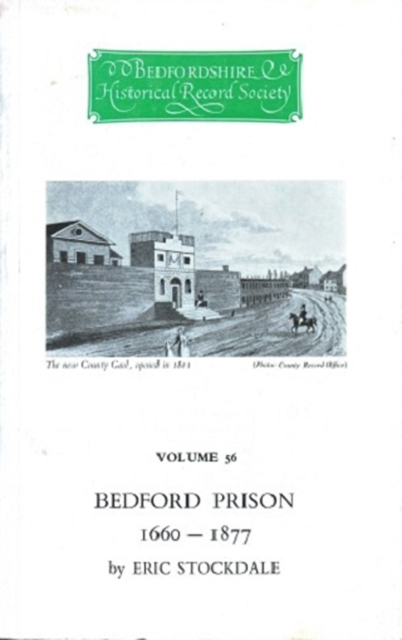Book contents
- Frontmatter
- Contents
- Acknowledgments
- Foreword
- Introduction
- Chapter 1 John Bunyan 1660-1688
- Chapter 2 Some Contemporaries of Bunyan
- Chapter 3 The Richardson-Howard Family of Jailers 1711-1814
- Chapter 4 Transportation to America Before 1776
- Chapter 5 John Howard 1773-1790
- Chapter 6 Samuel Whitbread 1790-1815
- Chapter 7 Philip Hunt 1815-1835
- Chapter 8 Philip Hunt 1815-1835
- Chapter 9 Lord John Russell In Office 1835-1841
- Chapter 10 The Rebuilding of The Jail 1839-1849
- Chapter 11 The Unsettled Years 1849-1853
- Chapter 12 The Final Years Before Nationalisation 1853-1877
- Conclusion
- Note On References and Spelling
- Appendix 1 Bedford in 1765
- Appendix 2 Jailers of Bedford 1710-1885
- Appendix 3 The Richardson-Howard Family
- Appendix 4 Site Plan of Bunyan’s Jail
- Appendix 5 Deed of Appointment of Jailers 1740
- Appendix 6 The Whitbread-Howard Link
- Appendix 7 Lord John Russell’s Family
- Appendix 8 Bedford in 1841
- Appendix 9 The Jail in 1849
- Index of Names
- Subject Index
- Bedfordshire Historical Record Society
- Miscellaneous Endmatter
Chapter 1 - John Bunyan 1660-1688
Published online by Cambridge University Press: 03 August 2023
- Frontmatter
- Contents
- Acknowledgments
- Foreword
- Introduction
- Chapter 1 John Bunyan 1660-1688
- Chapter 2 Some Contemporaries of Bunyan
- Chapter 3 The Richardson-Howard Family of Jailers 1711-1814
- Chapter 4 Transportation to America Before 1776
- Chapter 5 John Howard 1773-1790
- Chapter 6 Samuel Whitbread 1790-1815
- Chapter 7 Philip Hunt 1815-1835
- Chapter 8 Philip Hunt 1815-1835
- Chapter 9 Lord John Russell In Office 1835-1841
- Chapter 10 The Rebuilding of The Jail 1839-1849
- Chapter 11 The Unsettled Years 1849-1853
- Chapter 12 The Final Years Before Nationalisation 1853-1877
- Conclusion
- Note On References and Spelling
- Appendix 1 Bedford in 1765
- Appendix 2 Jailers of Bedford 1710-1885
- Appendix 3 The Richardson-Howard Family
- Appendix 4 Site Plan of Bunyan’s Jail
- Appendix 5 Deed of Appointment of Jailers 1740
- Appendix 6 The Whitbread-Howard Link
- Appendix 7 Lord John Russell’s Family
- Appendix 8 Bedford in 1841
- Appendix 9 The Jail in 1849
- Index of Names
- Subject Index
- Bedfordshire Historical Record Society
- Miscellaneous Endmatter
Summary
The Background to the Bunyan Case
John Bunyan was born at Elstow, just outside Bedford, in November 1628 and lived there until he joined the Parliamentary army at about the time of his sixteenth birthday in 1644. It is likely that Bunyan spent most of his military service in the nearby Newport Pagnell garrison, commanded by Sir Samuel Luke who wrote on 22 April 1645: ‘The thirty prisoners which I sent to Bedford jail broke all out on Saturday last, but they are all, save eight, taken again.’ If Bunyan was a member of the escort which brought the prisoners to the county jail he was later to know so well, he omitted to mention the fact in his autobiographical notes—but then they are sketchy about his military service.
Bunyan returned to civilian life at Elstow and earned his living as a tinker. In the following year a remarkable Royalist major, who was to have a great influence on Bunyan’s life, escaped from custody in Maidstone whilst awaiting execution. He was John Gifford who made his way to Bedford, where with eleven others he founded an Independent church in 1650. By 1653 Gifford’s church was so well established that he managed to obtain St. John’s church in Bedford for his congregation. John Brown, who was minister of the Bunyan church from 1864 to 1903, made the comment: ‘It is strange to see a congregational community in possession of the parish church, and its pastor installed there as rector. This could not, of course, have happened at any other time than between the years 1653 and 1660’.
It was in that tolerant year of 1653 that Bunyan joined Gifford’s Independent congregation, turning his back on his former ways. He also ‘shook off and foresook’ the company of a wild friend. Bunyan’s sense of humour appears in a short reference to this friend in Grace Abounding ‘But Harry, said I, why do you swear and curse thus? What will become of you if you die in this condition? He answered me in a great chafe: What would the devil do for company if it were not for such as I?’ Bunyan’s name was duly entered into the list of members of Gifford’s church immediately above those of William and Lettice Whitbread of Cardington, whose famous great-grandsons, John Howard and Samuel Whitbread the Younger, appear later in this work.
- Type
- Chapter
- Information
- Bedford Prison 1660-1877 , pp. 1 - 12Publisher: Boydell & BrewerFirst published in: 2023



